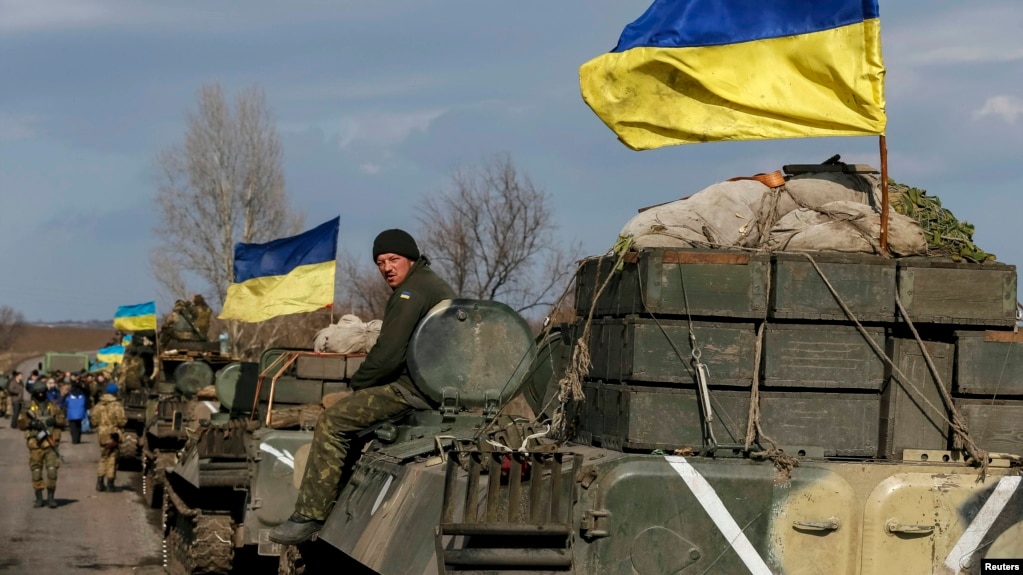For several weeks, speculation about Russia’s intentions with respect to Ukraine has been mounting. Moscow has been amassing tens of thousands of soldiers and massive amounts of military equipment on the Russia–Ukraine border as relations between the two countries continue to deteriorate. Some analysts estimate the number of Russian troops on the border at 100,000. Last spring, a similar number of soldiers were assembled for a military “exercise” — but the situation seems to be quite different this time.
To understand this, it is first necessary to grasp the importance of Ukraine for Russia, and especially for Russia’s defense. As George Friedman, a well-known expert on international affairs, summarizes it:
Belarus and Ukraine are the heart of Russian fears. The Ukrainian border is only a few hundred miles from Moscow and is therefore a major threat when in the hands of enemies. Distance will not wear down an enemy attacking from there. From the Russian point of view, the unwillingness of the United States to recognize these deep-seated fears suggests the United States has aggressive and dangerous designs. The only imaginable value Belarus and Ukraine hold for the Americans is to put Russia in a position where it must capitulate to the United States on all critical matters — or risk an outright invasion. Where the United States has no overriding interests, Russia has existential ones.
In other words, the position Ukraine takes toward Russia is not a trivial issue for Moscow. And it became even more crucial after 2014 and the so-called Euromaidan movement,1Translator’s note: Yevromaidan is a portmanteau in Ukrainian that combines “Europe” and “square.” It describes the wave of demonstrations in Maidan Nezalezhnosti (Independence Square) in Kyiv that began in November 2013 after the government decided to suspend the signing of an agreement to associate with the European Union. which brought down the government of Viktor Yanukovych — who was deemed “pro-Russian” (although the issue was more complex) and replaced it with pro-Western governments. Following this, Russia annexed Crimea and more or less openly supported “pro-Russian” militias in the Donbas, sometimes composed of extreme right-wing militants. This in turn led to a strengthening of pro-NATO sentiments among part of the Ukrainian population, while also bolstering Ukrainian far-right nationalist organizations.
Since then, Russia has had to adapt to a new reality in which it has lost control over a large part of this country that is so central to its defense strategy — especially in the face of potential aggression from the main European imperialist powers. But Moscow did not sit idly by; the Russians and tried to gain some bargaining power against the Western powers by intervening directly in the Syrian civil war on the side of Bashar al-Assad and against the U.S. allies. This intervention, along with others in Africa (notably, but not limited to, in Libya), was motivated in part by the objective of pressuring the Western powers on the Ukraine issue.
Determining precisely why Putin has decided to show his muscle against Ukraine and its European and, mostly, U.S. backers is difficult. Undoubtedly, one more local factor is the Ukrainian government’s use of Turkish drones against rebel forces in Donbas last October. Keep in mind that Turkish drones were instrumental in Azerbaijan’s victory over Armenia in last year’s conflict over Nagorno-Karabakh. The Russian regime saw this action not only as a “provocation” but as a direct threat, because it could change the balance of power on the ground — which for the Kremlin constitutes a “red line.”
There are, however, other international reasons that may explain Russia’s current attitude. One is the fact that the United States is in the midst of a geopolitical shift to the Indo-Pacific as part of its efforts to counter China. In this context, it is no secret that Washington is trying to avoid anything that helps advance a “deal” between China and Russia; further, many analysts and advisors have said that it would make sense for the United States to build a better relationship with Russia as a way to isolate Beijing. There is evidence testifying to this dynamic of defensive rapprochement between China and Russia. Putin, though, could try to play with this situation as a way to win some concessions from U.S. imperialism.
The rise in gas prices is another element that favors Russia’s position, but in this case it is against the European Union. Moscow is awaiting a green light from the Europeans to operate the Nord Stream 2 pipeline system, which offers both a commercial and a geopolitical advantage against Ukraine. As the Financial Times reported, “Putin said on Wednesday that gas prices would stabilize once the German regulator allowed supplies to western Europe via the Nord Stream 2 pipeline, which runs under the Baltic and bypasses Ukraine. Kyiv currently receives transit fees for Russian gas passing through its territory.”
What exactly, then, does Russia want from Ukraine? In Foreign Affairs, Dmitri Trenin — director of the Carnegie Moscow Center — cites a treaty proposal submitted by Russian authorities to the United States “as 2021 came to a close”:
Russia presented the United States with a list of demands that it said were necessary to stave off the possibility of a large-scale military conflict in Ukraine. In a draft treaty delivered to a U.S. diplomat in Moscow, the Russian government asked for a formal halt to NATO’s eastern enlargement, a permanent freeze on further expansion of the alliance’s military infrastructure (such as bases and weapons systems) in the former Soviet territory, an end to Western military assistance to Ukraine, and a ban on intermediate-range missiles in Europe. The message was unmistakable: if these threats cannot be addressed diplomatically, the Kremlin will have to resort to military action.
To put it clearly, Russia does not want to annex Ukraine, but at least wants to ensure its neutrality and a guarantee from the Western powers that it will not join NATO (a prospect that today seems quite remote). There is no guarantee, though, that the West will agree easily to Russia’s demands, unless it has something important to lose or gain. To give in to Russia now would mean losing important leverage over Moscow.
If Russia maintains its “hard” stance, however, NATO will be faced with its own contradictions on this issue. As Dmitri Trenin puts it, continuing in his Foreign Affairs piece,
If Russian President Vladimir Putin is acting as if he has the upper hand in this standoff, that’s because he does. … The United States and other NATO countries have condemned Russia’s moves but simultaneously suggested that they will not defend Ukraine, which is not a NATO member, and have limited their threats of retaliation to sanctions.
This does not mean that NATO is not observing this provocative attitude from a military point of view. Weapons, training missions, and military exercises in the Black Sea have increased in recent months. But does all this mean that a Russian invasion is imminent? No — or, at least, all indications seem to be that Russia would do so only if certain red lines were crossed, such as an offensive by Kyiv against the Donbas forces. Most likely, Russia is using its military mobilization as a major means of pressuring Western imperialism for concessions, while leaving the door open for further talks, without issuing a genuine ultimatum.
Indeed, a decision to attack Ukraine is very risky for Russia. There are logistical, material, and financial obstacles to such an invasion, but the most important obstacles are political and geopolitical. Invading a country is never an easy task. Even if at first military victories can be achieved relatively easily, the question becomes one of how to maintain power and perpetuate a regime favorable to Moscow. The resistance of the local population can very quickly become a headache, requiring a devastating expenditure of energy on the part of the occupying force. National sentiment could prompt millions of Ukrainians to resist. And as with imperialist invasions in the Middle East, Russia could find itself completely mired in a hostile Ukraine.
But there is another political question, this time in Russia itself: Is the Russian population ready and in favor of a war against Ukraine? On this matter, the Russian journalist Andrei Kolesnikov writes:
The average Russian is tired of self-deception and of persuading themselves that if a war does happen, it will not impact their lives or those of family members. Russian conformists are, of course, traditionally bellicose people, but theirs is the bellicosity of propaganda television talk shows, or the language of online hate. No conformists want a large-scale war: conscription is not part of the social contract, particularly at a time of accelerating inflation and economic stagnation. …
This year, the fear of a world war has increased dramatically, reaching a solid second place in a Levada Center list of the top issues causing Russians to worry. The other fears that have risen in parallel with that of war are those of an increasingly harsh political regime, mass repression, and arbitrary rule: the authoritarianization of the Russian political regime has not gone unnoticed.
Finally, from a geopolitical point of view , the Russian regime has considerably more to lose than the West in the event of defeat in a possible war in Ukraine. This does not mean that Russia could not engage in partial attacks, aerial bombings, or in support of Ukrainian fighters in the Donbas; a total invasion is obviously not the only alternative that exists.
Either way, the issue of Ukraine is too serious for Putin’s regime to bluff about a possible invasion or attack. This does not mean that war is imminent, but it clearly remains a possibility. It will be triggered only if Putin has no alternative or if he sees a possibility of political gain large enough to take the risk.
It is more than clear that in this dangerous situation for the people and for the working class, neither side represents any kind of progressive alternative. The Western imperialist powers employ hypocritical language about Ukrainian sovereignty in the face of Russian arrogance — but have no intention of straitjacketing that sovereignty any less. Both the West and Putin view Ukraine only as a pawn in their international competition. As for Putin’s regime, there is nothing anti-imperialist about it: it only defends the interests of Russian capitalism, even if that means subjugating other peoples.
A revolutionary internationalist position requires total opposition to these provocations and threats of war, and the unconditional defense of Ukraine’s right to self-determination in complete fraternity with the Russian workers and people.
First published in French on December 30 in Révolution Permanente.
Translation by Scott Cooper
Notes
| ↑1 | Translator’s note: Yevromaidan is a portmanteau in Ukrainian that combines “Europe” and “square.” It describes the wave of demonstrations in Maidan Nezalezhnosti (Independence Square) in Kyiv that began in November 2013 after the government decided to suspend the signing of an agreement to associate with the European Union. |
|---|











